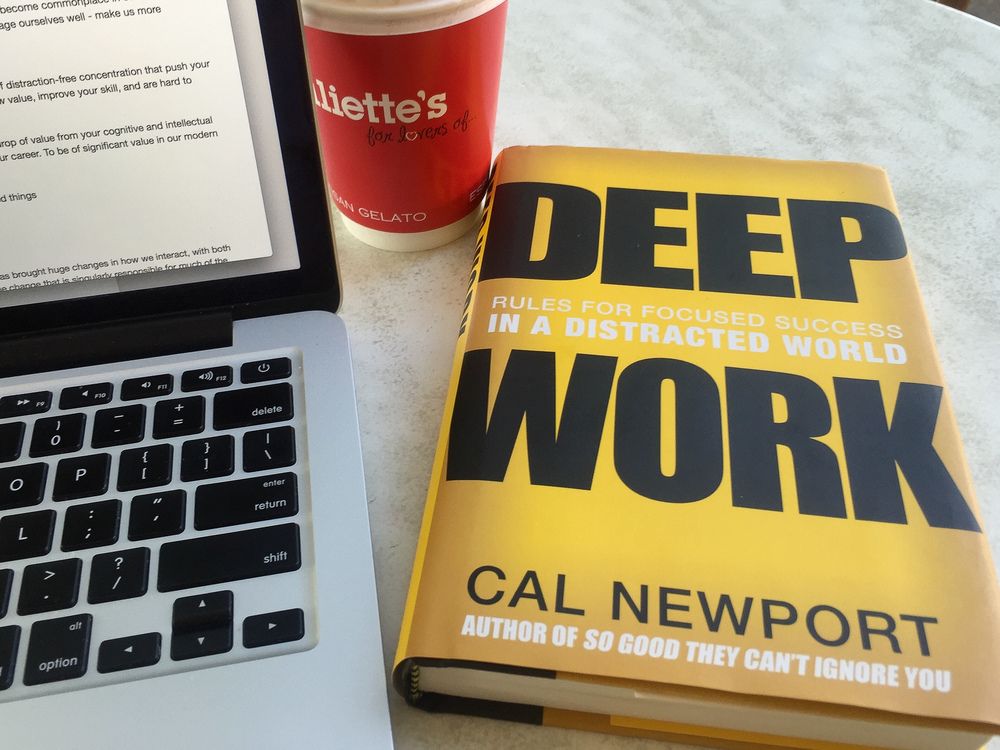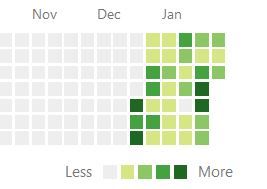
Deep Work: Professional activities performed in a state of distraction-free concentration that push your cognate capabilities to their limit. These efforts create new value, improve your skill, and are hard to replicate.
Deep work is valuable, rare, and meaningful. It's how we get things done, improve our skills, and add value to our world. And yet very few of us are partaking in this work philosophy. So, if it is so important and fruitful, why don't we?
Beginning My Journey
Jump to section titled: Beginning My JourneyAs 2017 loomed on the horizon, I was evaluating 2016 and how much I hadn't accomplished in my quest to be more proficient at what I do (web design/development). Sure, I had read a lot of books and run through many video tutorials. But what I lacked were unique and valuable skills to offer. I came to terms with the reality that I "knew" a lot, but couldn't seem to "do" a lot. In short, I longed to be good at something... a master or craftsman, rather than a jack of all trades. Not for the fame and glory. Just the satisfaction of taking pride in myself and abilities. Let's face it... when you're in your mid-thirties, doing a little of this and that is no longer glamorous.
To continue my story... as I was pondering these things, I ran across Cal Newport's book Deep Work by happenstance. It was perfect timing and I read it in under a week's time, which is a feat for someone with a full-time job and a toddler. His suggestions (rules) were basic:
- Work Deeply
- Embrace Boredom
- Quit Social Media
- Drain the Shallows
And, so, I began my journey of deep work on December 12, 2016.
My Takeaways (immediately after reading Deep Work)
Jump to section titled: My Takeaways (immediately after reading Deep Work)- be there
- say "no"
- block out the time
- prioritize focus and uninterrupted time as #1 for my well-being
- take breaks from focus, not breaks from fragmentation
- set my goals of what's most important (being a good mom & becoming a good web developer)
- social media is a lie; it doesn't make you successful or a better friend/family (reality check: people really don't care if you're posting or not)
- schedule my day so every block is meaningful (work & home)
- leave work at work (already knew... just an affirmation)
- integrating deep work means that I may seem aloof, stodgy, a Luddite.
Week 1: Trimming Distractions
Jump to section titled: Week 1: Trimming DistractionsOur ability to concentrate is only as strong as our commitment to train it.
Diving right in to Newport's 4-rule proposal to change my life, I immediately began evaluating and trimming away distractions that stole the time and focus I needed to work deeply and become a master of my craft. This included:
- checking Facebook on a weekly basis rather than hourly basis,
- turning off Twitter, email, and other phone app notifications,
- closing Outlook at work during project periods,
- unsubscribing from several email newsletters,
- taking notes on passing thoughts to look into later,
- bringing headphones to work (cubicle city), and
- saying no and/or delaying reaction to shallow tasks.
Week 2: Fighting for Focus
Jump to section titled: Week 2: Fighting for FocusDon't take breaks from distraction. Instead take breaks from focus.
After a week of being inspired, my second week swung like a pendulum trying to balance out the "extremes" I had taken. The first half of the week involved shallow work and play. By mid-week I had to re-center and form concrete goals. My goals: being a good web developer and a ever-present mama. With those goals in mind, I was able to defer distractions easier during family time, as well as courageously signing myself up for the 100 Days of Code challenge..
Week 3: Getting Serious
Jump to section titled: Week 3: Getting SeriousDedicating to 100 days of coding, cutting back on social networking, and embracing boredom all proved to be very serious steps to achieving my two goals. They opened the way for me to make time to pursue my craft, despite other day-to-day obligations. My third week of deep work inspired confidence and believing in what I was doing. I was able to jump into coding projects that I had been eyeing all year, but putting off due to lack of direction.
Week 4: Saying No
Jump to section titled: Week 4: Saying NoIt was four weeks in when "draining the shallows" really hit home. I started saying no to all sorts of things that could steal my time. Not only did I keep myself from getting dragged into work conversations that weren't productive, I also kept myself from picking up books that looked interesting yet didn't contribute to my current goals. Additionally, I rotated my desk at work to keep me from getting too distracted by people coming and going in the office.
Week 5: Reaping Benefits
Jump to section titled: Week 5: Reaping Benefits
Look at that green! I spent almost every day pushing code to Github to log my journey. This was the week that I felt that my efforts were paying off. Some code challenges started making sense. And the more i kept at it, the more I cared. Even Facebook had lost its appeal to me.
Week 6: Discovering Myself
Jump to section titled: Week 6: Discovering MyselfAfter six weeks of practicing deep work and rediscovering my motivation, I also discovered how I worked and what my rhythms of the day were. Like many others, my morning sets the mood for the day. When I accomplished coding first thing in the morning, it gave me wind to sail on for the day. If I got called into meetings, I'd lose traction. With those facts in hand, I'd do my best to leverage them.
I also discovered what was more important to me each day and learned the details that supported my goals. Blogging and tweeting my progress during this time has also helped me stay on track for myself. I haven't quit social media yet, but rather I've changed my perception of how to use it and for what gain. It's useful for tracking my milestones (jounaling). I've abandoned it as a means of self-promotion for future employment. I have too much work to do.
Next Steps
Jump to section titled: Next StepsKeep going! I can do this. I want to be proud of what I can do and what I've contributed. Goals will change, but this proposed means-to-an-end is one I think I'll stick with for quite some time.
Source
Jump to section titled: SourceNewport, Cal (2016). Deep Work: Rules for Focused Success in a Distracted World. Grand Central Publishing: New York.